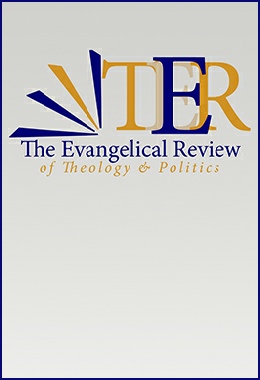THE EVANGELICAL REVIEW OF THEOLOGY & POLITICS
VOL. 5, 2017
 ESSAY SERIES
ESSAY SERIES
“Purge the Old Leaven:
Aspects of Church Discipline in
the Bible, Theology, and Culture”
A Series of Essays Exploring the Question of Church Discipline
Essay
Anthony Royle,
‘Editorial’
 An introduction to the papers, the historical background to Church discipline, post-war developments and studies, this series of essays comprise studies that investigate some of these theological themes in the context of the church discipline process. Each study explores the multiple viewpoints of the biblical authors, wrestling with contesting issues, and noting various possible solutions provided by different scholars. Some of these themes are juxtaposed between values upheld in Scripture i.e. excommunication and hospitality, judgement and salvation, forgiveness and condemnation and are explored to clarify possible conflicting views. Furthermore, these essays challenge some of the pervading presuppositions that people impute on the biblical texts as well as analysing postmodern and pluralistic thoughts that abound in churches today that hinder the task of church discipline.
An introduction to the papers, the historical background to Church discipline, post-war developments and studies, this series of essays comprise studies that investigate some of these theological themes in the context of the church discipline process. Each study explores the multiple viewpoints of the biblical authors, wrestling with contesting issues, and noting various possible solutions provided by different scholars. Some of these themes are juxtaposed between values upheld in Scripture i.e. excommunication and hospitality, judgement and salvation, forgiveness and condemnation and are explored to clarify possible conflicting views. Furthermore, these essays challenge some of the pervading presuppositions that people impute on the biblical texts as well as analysing postmodern and pluralistic thoughts that abound in churches today that hinder the task of church discipline.
Uploaded/Published : June 24, 2017 | ERTP Vol 5, 2017, pages, ES1-4
Essay
Stephen M. Vantassel, ‘Church Discipline: Rationale, Scope, Process, and Issue’
KEY WORDS
|| Closed Communion || Corrective Discipline ||
|| Excommunication || Judgement || Practical Theology ||
ABSTRACT
 This essay discusses why corrective discipline is necessary for healthy church life by showing how the popular understanding of Matthew 7:1 is incorrect and that the church is commanded to judge the behavior of its own members. The author explains what types of behaviors are suitable for church discipline and explains how the discipline process should proceed. The article concludes with insights for how churches lacking a discipline process can begin to implement biblical teaching in a manner worthy of Christian grace and pastoral concern.
This essay discusses why corrective discipline is necessary for healthy church life by showing how the popular understanding of Matthew 7:1 is incorrect and that the church is commanded to judge the behavior of its own members. The author explains what types of behaviors are suitable for church discipline and explains how the discipline process should proceed. The article concludes with insights for how churches lacking a discipline process can begin to implement biblical teaching in a manner worthy of Christian grace and pastoral concern.
Uploaded/Published : June 24, 2017 | ERTP Vol 5, 2017, pages, ES5-16
Essay
Ardel B. Caneday, ‘Lavishly Forgive Sins in order to Be Forgiven:
Jesus’ Parable of the Unmerciful Servant’
KEY WORDS
|| Confess || Forgive || Forgiveness || Guilt || Reconciliation || Remission ||
|| Repent || Repentance || Sin || Therapy || Therapeutic ||
ABSTRACT
 Christians universally confess “I believe in the forgiveness of sins.” Yet, with psychotherapy’s ascendancy and its blending with Christian theology, Christians have come to disagree whether in interpersonal relationships repentance proper conditions forgiveness of sins. Many use Jesus’ Parable of the Unmerciful Servant (Matthew 18:21-35) to endorse the popular accepted notion of “unconditional forgiveness.” After all, to Peter’s question—“Lord, how many times shall I forgive my brother or sister who sins against me? Up to seven times?”—Jesus replies, “I tell you, not seven times, but seventy-seven times.” On the contrary, Matthew’s placement of Jesus’ parable immediately following 18:15-20 shows that Jesus’s response to Peter and the parable that follows reinforces that repentance is necessary to receive forgiveness of sins in relationships with both fellow humans and God.
Christians universally confess “I believe in the forgiveness of sins.” Yet, with psychotherapy’s ascendancy and its blending with Christian theology, Christians have come to disagree whether in interpersonal relationships repentance proper conditions forgiveness of sins. Many use Jesus’ Parable of the Unmerciful Servant (Matthew 18:21-35) to endorse the popular accepted notion of “unconditional forgiveness.” After all, to Peter’s question—“Lord, how many times shall I forgive my brother or sister who sins against me? Up to seven times?”—Jesus replies, “I tell you, not seven times, but seventy-seven times.” On the contrary, Matthew’s placement of Jesus’ parable immediately following 18:15-20 shows that Jesus’s response to Peter and the parable that follows reinforces that repentance is necessary to receive forgiveness of sins in relationships with both fellow humans and God.
Uploaded/Published : June 24, 2017 | ERTP Vol 5, 2017, pages, ES17-32
Essay
Anthony Royle, ‘Jesus ate with Sinners:
Between Church Discipline and Hospitality’
KEY WORDS
|| Church Discipline || Hospitality || Table Fellowship ||
|| Jesus || Inclusivism || Lord’s Supper ||
ABSTRACT
 Most scholars agree that Jesus’ meal times with tax collectors and sinners were a major part of His ministry. This acknowledgement that Jesus ate with sinners has led to an inclusive approach to mission and function of the church by many churches today. There is a tendency to allow participation within the church community and at the Lord’s Table despite individuals living in a sinful lifestyle. This, however, defies the prohibitions of Jesus, Paul, and John who prohibited that those conducting themselves in immoral acts should be allowed to eat and fellowship with the church. Therefore, Jesus’ actions and teachings are juxtaposed between the open call of hospitality and the exclusive approach of church discipline. This essay seeks to harmonise these two aspects and present a principle for ministry in mission that is summarised in the Parable of the Wedding Banquet that “many are called but few are chosen”.
Most scholars agree that Jesus’ meal times with tax collectors and sinners were a major part of His ministry. This acknowledgement that Jesus ate with sinners has led to an inclusive approach to mission and function of the church by many churches today. There is a tendency to allow participation within the church community and at the Lord’s Table despite individuals living in a sinful lifestyle. This, however, defies the prohibitions of Jesus, Paul, and John who prohibited that those conducting themselves in immoral acts should be allowed to eat and fellowship with the church. Therefore, Jesus’ actions and teachings are juxtaposed between the open call of hospitality and the exclusive approach of church discipline. This essay seeks to harmonise these two aspects and present a principle for ministry in mission that is summarised in the Parable of the Wedding Banquet that “many are called but few are chosen”.
Uploaded/Published : June 24, 2017 | ERTP Vol 5, 2017, pages, ES33-42
Essay
David L. Williams, ‘He that is without Sin: Qualifications in Judging Others’
KEY WORDS
|| Matthew 7:1 || John 8:7 || Qualifications to Judge ||
|| Church Discipline || Biblical Literacy || Personal Holiness||
ABSTRACT
 It is beyond question that God disciplines his children such that their lives produce evidence of increasing moral purity. He achieves this correction through diverse means, one of which is the corrective fellowship of other believers. Yet contemporary emphasis on personal autonomy, postmodern attitudes to truth claims and simplistic, mantra type quotations of decontextualized scripture militates against the serious consideration and practice of moral correction amongst twenty-first century Christians. This paper will be divided into two separate sections; the first will address two of the most commonly misquoted scripture verses employed to make the case that Christians should not judge sin in the lives of fellow believers. It is my hope that these verses when commented upon within their context will enable a slightly different picture of the concept of judgement to emerge. The second section will then briefly address the qualities required of all Christians who seek to be obedient to God in making moral judgments upon and assist to correct the sin of fellow believers in Christ..
It is beyond question that God disciplines his children such that their lives produce evidence of increasing moral purity. He achieves this correction through diverse means, one of which is the corrective fellowship of other believers. Yet contemporary emphasis on personal autonomy, postmodern attitudes to truth claims and simplistic, mantra type quotations of decontextualized scripture militates against the serious consideration and practice of moral correction amongst twenty-first century Christians. This paper will be divided into two separate sections; the first will address two of the most commonly misquoted scripture verses employed to make the case that Christians should not judge sin in the lives of fellow believers. It is my hope that these verses when commented upon within their context will enable a slightly different picture of the concept of judgement to emerge. The second section will then briefly address the qualities required of all Christians who seek to be obedient to God in making moral judgments upon and assist to correct the sin of fellow believers in Christ..
Uploaded/Published : June 24, 2017 | ERTP Vol 5, 2017, pages, ES43-54
Essay
Peter H. Davids, ‘The Problem of the Others in 2 Peter and Jude’
KEY WORDS
|| False Teachers || Epicurianism || Greco-Roman Ethic ||
|| Eschatological Judgment || Rescue not Judgment || Eschatological Hope ||
ABSTRACT
 While in Jude the “others” appear to be individuals who have entered the community with a Greco-Roman ethic that was dangerous to the “beloved,” in 2 Peter one is dealing with teachers who are influenced by an Epicurean-like ethic focused on pleasure. Jude instructs the “beloved” to “rescue” the “others” rather than expel them. 2 Peter joins Jude in urging the faithful to strengthen their faith/ethic, but rather than hold out hope for the "false teachers" he focuses on God's ability to rescue the faithful while judging others. This means ultimate salvation for the faithful, if they remain faithful, and doom for the “false teachers.” Still, 2 Peter leaves judgment to God and does not instruct the faithful to expel the “false teachers.”
While in Jude the “others” appear to be individuals who have entered the community with a Greco-Roman ethic that was dangerous to the “beloved,” in 2 Peter one is dealing with teachers who are influenced by an Epicurean-like ethic focused on pleasure. Jude instructs the “beloved” to “rescue” the “others” rather than expel them. 2 Peter joins Jude in urging the faithful to strengthen their faith/ethic, but rather than hold out hope for the "false teachers" he focuses on God's ability to rescue the faithful while judging others. This means ultimate salvation for the faithful, if they remain faithful, and doom for the “false teachers.” Still, 2 Peter leaves judgment to God and does not instruct the faithful to expel the “false teachers.”
Uploaded/Published : June 24, 2017 | ERTP Vol 5, 2017, pages, ES55-62
Essay
Douglas Groothuis, ‘Self-Discipline’
KEY WORDS
|| Self-Discipline || Self-Denial || Authority of Scripture ||
|| Life of the Mind || Apologetics ||
ABSTRACT
 Christians are disciples. This means they must be self-disciplined under the lordship of Jesus Christ, who has all authority in heaven and on earth. There is no self-discipline without self-denial. We must resist worldliness in order to embrace godly habits of the mind. That means recognizing the truthfulness and pertinence of the Holy Scriptures and studying them arduously for the sake of the church and the world. If we do not, we may give a false witness to the gospel of God and so disgrace ourselves and the church. However, as we lean on the Lord and are filled with the Spirit, we know that our labour in the Lord is not in vain..
Christians are disciples. This means they must be self-disciplined under the lordship of Jesus Christ, who has all authority in heaven and on earth. There is no self-discipline without self-denial. We must resist worldliness in order to embrace godly habits of the mind. That means recognizing the truthfulness and pertinence of the Holy Scriptures and studying them arduously for the sake of the church and the world. If we do not, we may give a false witness to the gospel of God and so disgrace ourselves and the church. However, as we lean on the Lord and are filled with the Spirit, we know that our labour in the Lord is not in vain..
Uploaded/Published : June 24, 2017 | ERTP Vol 5, 2017, pages, ES63-72










 ESSAY SERIES
ESSAY SERIES An introduction to the papers, the historical background to Church discipline, post-war developments and studies, this series of essays comprise studies that investigate some of these theological themes in the context of the church discipline process. Each study explores the multiple viewpoints of the biblical authors, wrestling with contesting issues, and noting various possible solutions provided by different scholars. Some of these themes are juxtaposed between values upheld in Scripture i.e. excommunication and hospitality, judgement and salvation, forgiveness and condemnation and are explored to clarify possible conflicting views. Furthermore, these essays challenge some of the pervading presuppositions that people impute on the biblical texts as well as analysing postmodern and pluralistic thoughts that abound in churches today that hinder the task of church discipline.
An introduction to the papers, the historical background to Church discipline, post-war developments and studies, this series of essays comprise studies that investigate some of these theological themes in the context of the church discipline process. Each study explores the multiple viewpoints of the biblical authors, wrestling with contesting issues, and noting various possible solutions provided by different scholars. Some of these themes are juxtaposed between values upheld in Scripture i.e. excommunication and hospitality, judgement and salvation, forgiveness and condemnation and are explored to clarify possible conflicting views. Furthermore, these essays challenge some of the pervading presuppositions that people impute on the biblical texts as well as analysing postmodern and pluralistic thoughts that abound in churches today that hinder the task of church discipline. This essay discusses why corrective discipline is necessary for healthy church life by showing how the popular understanding of Matthew 7:1 is incorrect and that the church is commanded to judge the behavior of its own members. The author explains what types of behaviors are suitable for church discipline and explains how the discipline process should proceed. The article concludes with insights for how churches lacking a discipline process can begin to implement biblical teaching in a manner worthy of Christian grace and pastoral concern.
This essay discusses why corrective discipline is necessary for healthy church life by showing how the popular understanding of Matthew 7:1 is incorrect and that the church is commanded to judge the behavior of its own members. The author explains what types of behaviors are suitable for church discipline and explains how the discipline process should proceed. The article concludes with insights for how churches lacking a discipline process can begin to implement biblical teaching in a manner worthy of Christian grace and pastoral concern. Christians universally confess “I believe in the forgiveness of sins.” Yet, with psychotherapy’s ascendancy and its blending with Christian theology, Christians have come to disagree whether in interpersonal relationships repentance proper conditions forgiveness of sins. Many use Jesus’ Parable of the Unmerciful Servant (Matthew 18:21-35) to endorse the popular accepted notion of “unconditional forgiveness.” After all, to Peter’s question—“Lord, how many times shall I forgive my brother or sister who sins against me? Up to seven times?”—Jesus replies, “I tell you, not seven times, but seventy-seven times.” On the contrary, Matthew’s placement of Jesus’ parable immediately following 18:15-20 shows that Jesus’s response to Peter and the parable that follows reinforces that repentance is necessary to receive forgiveness of sins in relationships with both fellow humans and God.
Christians universally confess “I believe in the forgiveness of sins.” Yet, with psychotherapy’s ascendancy and its blending with Christian theology, Christians have come to disagree whether in interpersonal relationships repentance proper conditions forgiveness of sins. Many use Jesus’ Parable of the Unmerciful Servant (Matthew 18:21-35) to endorse the popular accepted notion of “unconditional forgiveness.” After all, to Peter’s question—“Lord, how many times shall I forgive my brother or sister who sins against me? Up to seven times?”—Jesus replies, “I tell you, not seven times, but seventy-seven times.” On the contrary, Matthew’s placement of Jesus’ parable immediately following 18:15-20 shows that Jesus’s response to Peter and the parable that follows reinforces that repentance is necessary to receive forgiveness of sins in relationships with both fellow humans and God. Most scholars agree that Jesus’ meal times with tax collectors and sinners were a major part of
Most scholars agree that Jesus’ meal times with tax collectors and sinners were a major part of  It is beyond question that God disciplines his children such that their lives produce evidence of increasing moral purity. He achieves this correction through diverse means, one of which is the corrective fellowship of other believers. Yet contemporary emphasis on personal autonomy, postmodern attitudes to truth claims and simplistic, mantra type quotations of decontextualized scripture militates against the serious consideration and practice of moral correction amongst twenty-first century Christians. This paper will be divided into two separate sections; the first will address two of the most commonly misquoted scripture verses employed to make the case that Christians should not judge sin in the lives of fellow believers. It is my hope that these verses when commented upon within their context will enable a slightly different picture of the concept of judgement to emerge. The second section will then briefly address the qualities required of all Christians who seek to be obedient to God in making moral judgments upon and assist to correct the sin of fellow believers in Christ..
It is beyond question that God disciplines his children such that their lives produce evidence of increasing moral purity. He achieves this correction through diverse means, one of which is the corrective fellowship of other believers. Yet contemporary emphasis on personal autonomy, postmodern attitudes to truth claims and simplistic, mantra type quotations of decontextualized scripture militates against the serious consideration and practice of moral correction amongst twenty-first century Christians. This paper will be divided into two separate sections; the first will address two of the most commonly misquoted scripture verses employed to make the case that Christians should not judge sin in the lives of fellow believers. It is my hope that these verses when commented upon within their context will enable a slightly different picture of the concept of judgement to emerge. The second section will then briefly address the qualities required of all Christians who seek to be obedient to God in making moral judgments upon and assist to correct the sin of fellow believers in Christ.. While in Jude the “others” appear to be individuals who have entered the community with a Greco-Roman ethic that was dangerous to the “beloved,” in 2 Peter one is dealing with teachers who are influenced by an Epicurean-like ethic focused on pleasure. Jude instructs the “beloved” to “rescue” the “others” rather than expel them. 2 Peter joins Jude in urging the faithful to strengthen their faith/ethic, but rather than hold out hope for the "false teachers" he focuses on God's ability to rescue the faithful while judging others. This means ultimate salvation for the faithful, if they remain faithful, and doom for the “false teachers.” Still, 2 Peter leaves judgment to God and does not instruct the faithful to expel the “false teachers.”
While in Jude the “others” appear to be individuals who have entered the community with a Greco-Roman ethic that was dangerous to the “beloved,” in 2 Peter one is dealing with teachers who are influenced by an Epicurean-like ethic focused on pleasure. Jude instructs the “beloved” to “rescue” the “others” rather than expel them. 2 Peter joins Jude in urging the faithful to strengthen their faith/ethic, but rather than hold out hope for the "false teachers" he focuses on God's ability to rescue the faithful while judging others. This means ultimate salvation for the faithful, if they remain faithful, and doom for the “false teachers.” Still, 2 Peter leaves judgment to God and does not instruct the faithful to expel the “false teachers.” Christians are disciples. This means they must be self-disciplined under the lordship of Jesus Christ, who has all authority in heaven and on earth. There is no self-discipline without self-denial. We must resist worldliness in order to embrace godly habits of the mind. That means recognizing the truthfulness and pertinence of the Holy Scriptures and studying them arduously for the sake of the church and the world. If we do not, we may give a false witness to the gospel of God and so disgrace ourselves and the church. However, as we lean on the Lord and are filled with the Spirit, we know that our labour in the Lord is not in vain..
Christians are disciples. This means they must be self-disciplined under the lordship of Jesus Christ, who has all authority in heaven and on earth. There is no self-discipline without self-denial. We must resist worldliness in order to embrace godly habits of the mind. That means recognizing the truthfulness and pertinence of the Holy Scriptures and studying them arduously for the sake of the church and the world. If we do not, we may give a false witness to the gospel of God and so disgrace ourselves and the church. However, as we lean on the Lord and are filled with the Spirit, we know that our labour in the Lord is not in vain..